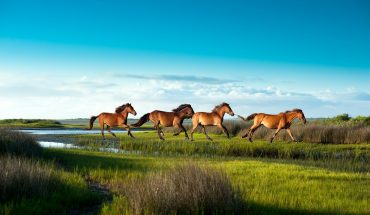WHERE THE BUFFALO ROAM
Hillsborough’s Vista Wood bison ranch
by Jessie Ammons
photographs by Lissa Gotwals
A stone buffalo statue greets visitors at the entrance to Vista Wood Ranch, which sits at a bucolic turn a few miles off of Highway 86 in Hillsborough. Then come the real thing: 15 1,000-pound furry creatures that would look right at home in an old Western movie, but they’re contentedly munching hay and meandering through green, dandelion-studded North Carolina pastures.
Then comes their doting caretaker. “We just had a baby!” shouts Jeff Peloquin. A baby buffalo was born an hour earlier, and another four are expected before summer’s over. “They take care of their own young. Don’t touch them, don’t mess with them, don’t go near them. They’ve got it covered.”
Self-sufficient describes this entire buffalo operation, a hobby for construction company owner Peloquin and his wife, Linda. The farm produces a few thousand pounds of organic buffalo (also referred to as bison) meat each year – burgers, steaks, and brats. The Peloquins make just enough to break even, Jeff Peloquin says, but they’re not in it for the profit. “This is solace.”
‘Total harmony’
Vista Wood has been a long time coming for the Peloquins. The couple lived on the outskirts of Chapel Hill for decades, running a sustainable homebuilding company and dreaming of owning more land. By 2004, they were ready to move to a setting that suited their “agrarian tastes” and bought 82 acres north of Hillsborough. The property included an old rundown farmhouse and wide open spaces, and that was about it.
“I knew I wanted a farm of some sort,” Peloquin says, “but I wanted to make it practical.” He wasn’t yet ready to retire, and planting and harvesting fields of produce didn’t seem realistic at his stage of life. Animals made better sense. “I wanted an animal that is very well-adapted and indigenous to North Carolina. People don’t realize it, but buffaloes are indigenous. They lived here for millions of years, from here to California, before America was settled.”
Technically, these are American bison, not buffalo. True buffaloes are Asian and African members of the same animal family, but hundreds of years ago, Native Americans called these native bison “buffalo,” and the common reference has lasted. Peloquin’s interest in Native American culture led him to consider raising bison.
“It was (Native Americans’) food source, their shelter source, their fuel source, their tool source. They used every component of the animal: They used the hides for clothes and shelter, the bones for tools, the fur for diapers.” It’s why, today, the animals are still “instinctively well-suited to living here. They already know what they can and can’t eat intuitively.”
Most livestock require a farmer to domesticate and train them, but buffalo don’t. Self-sufficiency, Peloquin says, makes for a natural, sustainable final product. “We don’t give the herd any feed, they only eat grass and hay. We don’t give them hormone shots, we don’t give them antibiotics.” He gestures around at the 25 pastured acres, representing more than an acre per animal. “They’re clearly pasture-raised.”
Thanks in part to their roaming, Vista Wood buffalo meat, depending on the cut, tastes lighter, leaner, and usually more tender than beef. Early on, the Peloquins sold their meat at a few local farmers markets, but couldn’t find a comfortable balance between supply and demand. “We had more customer requests than we could produce … until this becomes my full-time profession,” he says. Until then, Vista Wood buffalo cuts are available at the Hillsborough Farm and Garden center. It rarely runs out, but if you don’t find the exact type or quantity you’re looking for there, you’ll have to wait it out. As one of only a handful of buffalo producers within a few-hours’ drive, many folks believe the meat is worth the wait.
Peloquin says that’s because buffalo is a source of protein people feel good about. After becoming nearly extinct in the late 1800s, bison still represent a small portion of Americans’ meat consumption. “More cattle are slaughtered in a day than bison in a year,” Peloquin says. “But most of the people that raise bison are like myself: very conscientious of the animal and their surroundings and their life. It’s not necessarily as profitable, but what’s a profit?”
At Vista Wood, profit is achieved with “total harmony between animal and human and nature.” To that end, the Peloquins use other parts of the property as a wedding venue and have recently begun renting a private room out on Airbnb. Guests will likely meet one of the Peloquins’ three children: son Clint Peloquin, who ranches alongside Jeff and Linda. It’s a simple, friendly, family affair and visitors are always welcome.
“We love sharing: our meat, the process,” Native American culture, and their scenic countryside spot. “The quality of life out here is high.”









